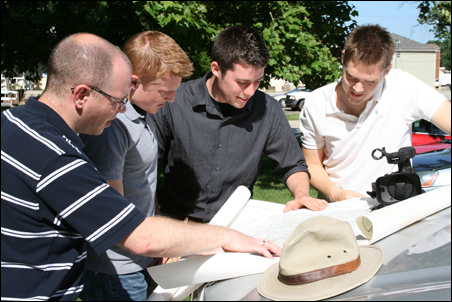EIU Team Traveling to Gulf to Document 'Human Element' of Oil Spill
Jun-16-2010|
|
For most people, the mention of the massive oil spill in the Gulf of Mexico conjures up images of an underground pipe spewing crude, plumes of oil floating in the water, and oil-soaked wildlife struggling to survive.
And while those are important, Eastern Illinois University faculty member Cameron Craig wants to make sure they don't overshadow the human element of the tragedy.
That's why Craig -- a documentary-maker whose films focus on how the environment and humanity are connected -- is heading to Louisiana this weekend. His team will spend two days taking a closer look at how the BP oil spill will affect people on the coast and throughout the country.
"Everybody is feeling distressed about the wildlife," Craig said. "Yes, the wildlife is very important, but what about the human element?"
Craig will be joined by three EIU students: Zach Nugent of Sheridan, a regional Emmy-winning reporter for WEIU-TV's "News Watch"; Michael Gismondi of Buffalo Grove, a WEIU-TV weather forecaster; and A.J. Schubert of Charleston, a graduate assistant in EIU's Center for Academic Technology Support.
The team will spend Friday and Saturday talking to the people most affected by the oil spill, "the hard-working people," along the coast.
Although they have some plans in place, they are leaving much of the trip unscripted so that the real story has the opportunity to unfold, rather than trying to make the reality fit their expectations.
"We are going down to connect and reflect," Craig said, "and bring that connection and reflection back to Eastern."
Since joining the EIU faculty in 2005, Craig has overseen project after project that has given students first-hand experience, while at the same time educating others. His work has aired on PBS stations throughout the region.
John Stimac, chair of the geology/geography department, said Craig has a knack for tackling issues that affect not just geology and geography, but other disciplines as well.
"It's similar to all of the projects he's done in that it's innovative," Stimac said. "He gets students involved, gets them out of the classroom and makes them think outside the box."
This project differs from the others in the sense that it is not taking a look back at history, but rather looking at a history-making event taking place right now.
Nugent, the WEIU-TV student reporter, said the trip is a great opportunity to tell the stories that need to be told.
"It's something we normally don't get to do in our newsroom," Nugent said. "We talk about the oil spill, and we see it, but we don't really see what it means to people. If we can show that perspective, that scale, people can have a better idea of the impact."
Nugent said that he wants to allow viewers to "see and feel the impact this disaster is having … right in our backyard."
The trip should yield a variety of educational tools. In addition to a full-length documentary, other possibilities include a week-long WEIU series featuring Nugent's reporting, educational clips for use in K-12 classrooms around the region, and opportunities for the students to visit area schools to present first-hand accounts of what they witnessed on the Gulf.
Craig also hopes to revisit Louisiana in the future to measure the long-term impact.
"For such a brief little project, this can be used as a seed for many other projects," Stimac said.
The point of it all, Craig said, is to educate not only his students, but also children and teens throughout the area.
"What we're doing is providing a foundation for the young people who will one day make decisions for millions of people, whether as a CEO for an oil company or as an educator," Craig said. "We want to give them something to think about when they come of age."
Craig emphasized that the purpose of the trip is not to sensationalize the events, but rather to present a straightforward, objective view that is hard to find in mainstream media reports.
"We are there to tell the story in a way that the viewers can make decisions for themselves," Craig said.
The team encourages the public to follow their progress via a blog at https://gehd.blogspot.com, where they plan to post updates throughout the weekend.
